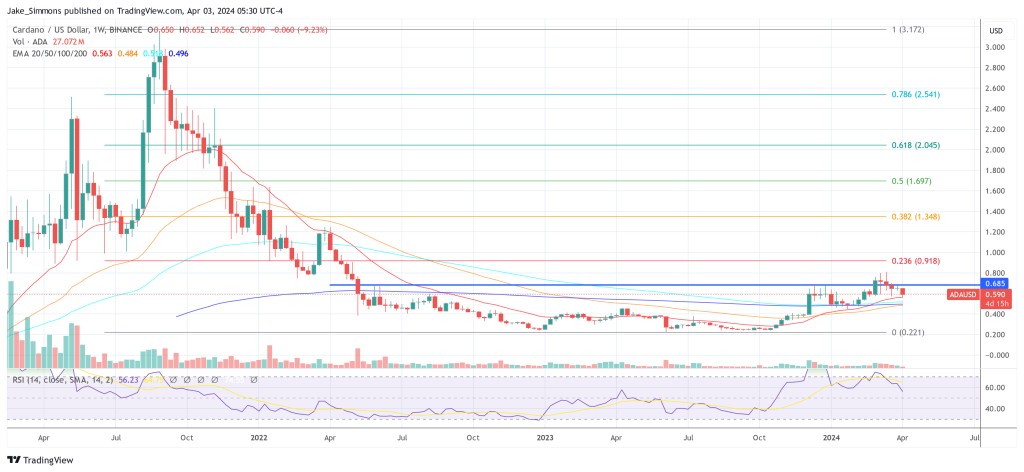During a recent interview with DailyCoin, Frederik Gregaard, the CEO of the Cardano Foundation, revealed that multiple US states have expressed keen interest in collaborating with Cardano to explore the development of blockchain-based voting systems. This revelation underscores the growing recognition of blockchain technology’s potential to revolutionize traditional voting processes.
The interest from various US states signifies a notable shift in perspective towards adopting innovative solutions to enhance the security, transparency, and accessibility of elections. As concerns about election integrity and cybersecurity continue to mount, blockchain technology offers a compelling alternative by providing a tamper-proof and auditable ledger for recording votes.
Cardano, known for its robust and scalable blockchain infrastructure, appears to be a preferred choice for these states seeking to modernize their electoral systems. With its focus on sustainability, interoperability, and regulatory compliance, Cardano presents a promising platform for implementing secure and transparent voting mechanisms.
The potential collaboration between the Cardano Foundation and US states holds significant implications for the future of democratic processes. By leveraging blockchain technology, governments can mitigate risks associated with traditional voting methods, such as tampering, fraud, and logistical challenges. Moreover, blockchain-based voting systems have the potential to increase voter participation and trust in electoral outcomes.
As discussions progress between the Cardano Foundation and interested US states, stakeholders will likely scrutinize various aspects, including technical feasibility, regulatory compliance, and public acceptance. However, the prospect of blockchain-enabled voting represents a pivotal step towards modernizing democratic practices and ensuring the integrity of electoral processes in the digital age.
Several US states contemplate implementing Cardano for election security.
Gregaard acknowledged the interest from governmental bodies in utilizing blockchain to improve electoral processes, confirming the engagement with several US states. These states are interested in developing a “lightweight” blockchain solution to enhance transparency and accountability in voting systems. While Gregaard expressed enthusiasm about these inquiries, he also highlighted the challenges, particularly regarding the requested implementation timeframe by the states. He mentioned, “We have been approached by a couple of states in the US, saying, ‘hey can you help us to do a light-weight blockchain solution to make it more transparent and accountable how we are voting?’. I still have to look at it if we can make this happen in the time frame they’re looking at.”
US States 🇺🇸 have approached the Cardano Foundation for help with voting on the blockchain. @F_Gregaard @Cardano_CF @AltcoinDailyio #Cardano $ADA https://t.co/yQizvBqOM0 pic.twitter.com/87OTP15MFT
— St₳kΣ with Pride 🌈 (@StakeWithPride) March 28, 2024
Gregaard’s disclosure about these advancements lacked specific details regarding the discussions or the states’ precise needs. This absence of information makes it challenging to evaluate the potential deployment of such a system soon. Nonetheless, the Cardano Foundation’s established expertise with the Catalyst voting system, where ADA holders engage in project proposals and decision-making, offers a strong basis for investigating broader applications in governmental voting procedures.
While the Catalyst system has played a pivotal role in fostering growth within the ecosystem and showcasing blockchain’s ability to facilitate transparent and inclusive voting mechanisms, transitioning this technology to state elections presents a host of challenges, particularly regarding voter identity verification.
The Cardano Foundation is currently working on a solution that incorporates decentralized identity (DID), but it remains a work in progress. Effectively integrating blockchain into statewide elections necessitates overcoming these hurdles and others to establish a system that is both secure and capable of managing the magnitude of public elections.
Despite the undisclosed details of discussions between the Cardano Foundation and the interested US states, the potential advantages of blockchain voting are substantial. Compared to traditional postal voting systems, blockchain offers heightened security, reliability, and transparency, mitigating risks such as fraud and errors. Blockchain technology can ensure accurate vote counting, reduce the likelihood of lost votes, bolster voter anonymity, and safeguard against manipulation.
However, it remains unclear which states have engaged with the Cardano Foundation, and whether other blockchain platforms like Ethereum or Solana have been approached. As of the latest update, ADA is trading at $0.59.

read more about: Charles Hoskinson, the founder of Cardano, refutes rumors suggesting the abandonment of the Hydra scaling project.



